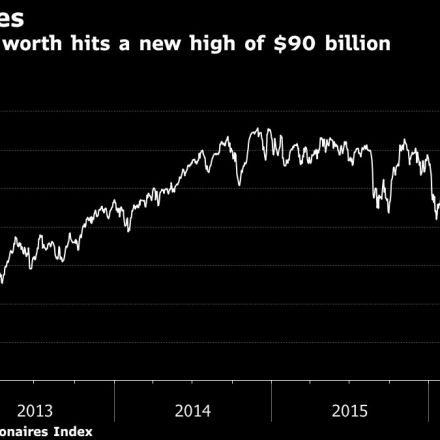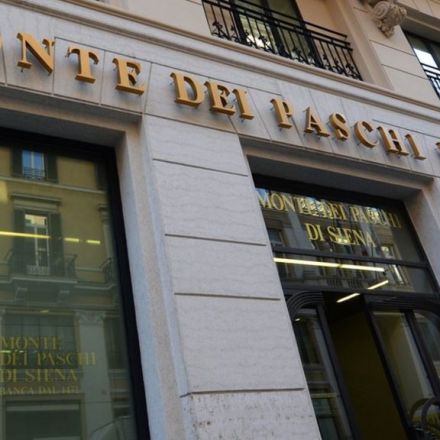

9 years ago
12
Bill Gates' net worth hits $90B, proving Thomas Piketty's point
Thomas Piketty said that capitalism's primary beneficiaries aren't those who make amazing things that improve the world -- rather, it favors those who have a lot of money to begin with.
Continue Reading
Additional Contributions:



























Join the Discussion
Are we saying Bill Gates does not make amazing things which improve the world?
That's not Piketty's point at all. What Picketty's talking about isn't to do with Gates, per se. You can see it, a bit, though in how at one point Microsoft is facing serious antitrust enforcement, and then one presidential election later, that'd conveniently evaporated away.
Gates isn't a brilliant genius, like Woz was. He was a rather bad programmer, whose last published code was the pointless, broken 'Find' command on the TRS-80 Model 100. His signature success in business remains fraudulently selling IBM what they thought would be a CP/M-compatible OS for $200K. They thought up until the day the PC shipped that it was going to be backward compatible with the dominant OS of the day.
It's awkward hearing the awe and reverence people seem to have for a man, who to me at any rate, seems very much a Bond villain pursuing a maniacal scheme to harness masses of disease-carrying, genetically-engineered mosquitos to do his wicked bidding. So that might be my point, but It's not what the piece is saying, I don't think.
Uhm... wut?
My comment was on subtitle which reads "Thomas Piketty said that capitalism's primary beneficiaries aren't those who make amazing things that improve the world -- rather, it favors those who have a lot of money to begin with". Bill Gates did not have $90 billion to begin with. He created something IMHO amazing.
On Piketty's point that "once a fortune is established, the capital grows according to a dynamic of its own, and it can continue to grow at a rapid pace for decades simply because of its size" - I see that this is the case and agree.
Your response has more wtfs per sentence than I can manage.
e.g.
Where to start? Mixing of tenses implies Gates is not a brilliant genius but neither is (presumably) Steve Wozniak (who is no longer a genius because "Woz was". How does this drive your point? Better yet - what is your point?
Then there's this
what is this i dont even. I think we can all agree that Gates' signature in business is creating and running a multi-trillion dollar turnover company called Microsoft.
If you are referring to Microsoft's accusation and licensing of DOS to IBM in 1981- there was nothing fraudulent about that deal.
When IBM approached MS for a 8086 OS, MS referred them to Digital Research (DR) and their 8080 OS (CP/M). DR's CEO's wife refused to let IBM representatives in the house. IBM representatives then asked MS if they can help them on a short notice for a 8086 PC that was due to ship within a year. MS looked and found Tim Patterson who previously authored DOS (a CP/M compatible clone based on DR's manual). So MS bought DOS from Tim, hired Tim to port DOS to 8086, re-branded the ported version as MS-DOS, licensed MS-DOS to IBM and, according to you, when you add all that up - Bill Gates is a fraud 8/
Finally, there's this:
W.T.F.
:If you are referring to Microsoft's accusation and licensing of DOS to IBM in 1981- there was nothing fraudulent about that deal.
When IBM approached MS for a 8086 OS, MS referred them to Digital Research (DR) and their 8080 OS (CP/M). DR's CEO's wife refused to let IBM representatives in the house. IBM representatives then asked MS if they can help them on a short notice for a 8086 PC that was due to ship within a year. MS looked and found Tim Patterson who previously authored DOS (a CP/M compatible clone based on DR's manual). So MS bought DOS from Tim, hired Tim to port DOS to 8086, re-branded the ported version as MS-DOS, licensed MS-DOS to IBM and, according to you, when you add all that up - Bill Gates is a fraud 8/"
That certainly is a lot of legalease to throw at a comment. Why so serious?
I'm not sure what you mean. That is the exact sequence of events.
I looked it up when someone herp-derped the ol' "hurr durr Gates stole DOS cuz hes a poser" non-point years ago. Now it's my mission to go around internet correcting the misconception.
There could be worse missions in life of course!
This is not the son of a poor sharecropper we're talking about. The Gates family had been extremely wealthy for generations before William Henry "Bill" Gates III came along. You know, William Henry "Bill" Gates II's boy?
By which you mean a pile of money, right? Something about the tone of awe you have brings Scrooge McDuck's swimming pools of coinage to mind.
You know Woz was in an airplane crash, right? Head trauma? That he's not the same now? Or are you not familiar with his work?
No, I don't agree with that. If we're going to start evaluating the legacy of an American titan like this, here and now, let's make sure to remember that instead of plowing those astronomical cash inputs back into developing new system software from scratch around sound practice and solid engineering, Gates' Microsoft was all about achieving absolute market dominance and maximum profit extraction at all costs. Even when it meant grossly unfair trade practices and outright cartel collusion. Gates's primary accomplishment may've been, in the long view, snatching away from IBM their lock on the "computing trust." Turnabout is fair play, though. IBM'd snatched theirs away from NCR.
Or are you perfectly content that Microsoft has always done what it could to make good products? Me, I think they wasted a lot of money, a lot of chances, and made enemies for the sheer sake of it.
That's not the way the story was told around the campfire by Digital Research survivors in the DR-DOS and GEM era. You can have your hagiography of Saint Bill, and I'll have mine, however apocryphal either may in fact be. There's a lot of lore about how Microsoft climbed to the top the way it did that doesn't exactly mesh with the going version of their corporate history. You know what? A lot of it's absolutely true, but very little known.
Seeing as how you have no end of 'WTF's to give, make sure to pipe up if you've never heard of trusts before, and don't know what anti-trust laws are meant to deal with.
The point is that his personal wealth, since he left Microsoft, has grown without him making any amazing things. Just doing what large amounts of money do without much help.
Didn't the net worth of Bill Gates hit $100 billion in 1999?
Actually, more than $100B in 1999. As those schmendricks at Forbes put it:
Upvoted for schmendricks...I mean really, who has the chutzpah to use a word like that!
That was when he was still at Microsoft? It probably counts all of Microsoft. I think this is just about his personal wealth.